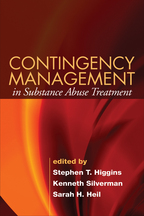Contingency Management in Substance Abuse Treatment
Edited by Stephen T. Higgins, Kenneth Silverman, and Sarah H. Heil
Foreword by Joseph V. Brady
I. Contingency Management Across Substances
2. Cocaine, Stephen T. Higgins, Sarah H. Heil, Randall E. Rogers, and Laura Chivers
3. Opioids, David H. Epstein and Kenzie L. Preston
4. Marijuana, Alan J. Budney and Catherine Stanger
5. Methamphetamines, John M. Roll and Thomas Newton
6. Tobacco, Stacey C. Sigmon, Richard J. Lamb, and Jesse Dallery
7. Alcohol, Conrad J. Wong, Kenneth Silverman, and George E. Bigelow
8. Medication Compliance, Bruce J. Rounsaville, Marc Rosen, and Kathleen M. Carroll
II. Special Populations
9. Homeless Populations, Jesse B. Milby and Joseph Schumacher
10. Pregnant and Postpartum Women, Sarah H. Heil. Jin H. Yoon, and Stephen T. Higgins
11. People with Mental Illness, Jennifer W. Tidey and Rick Ries
12. Adolescents, Suchitra Krishnan-Sarin, Amy M. Duhig, and DanaA.Cavallo
III. Dissemination
13. Large-Scale Dissemination Efforts in Drug Abuse Treatment Clinics, Maxine L. Stitzer and Scott Kellogg
14. Lowering Costs in Drug Abuse Treatment Clinics, Nancy M. Petry and Sheila M. Alessi
15. Use of Community Donations and Clinic Rebates to Fund Contingency Management in Community Treatment Clinics, Leslie Amass and Jonathan B. Kamien
16. Contingency Management in an Entitlement Rehabilitation Setting: An Example from the Veterans Health Administration, Charles Drebing, Bruce J. Rounsaville, and Robert Rosenheck
17. Employment-Based Reinforcement in the Treatment of Drug Addiction, Wendy D. Donlin, Todd W. Knealing, and Kenneth Silverman
18. Contingency Management in Adult Criminal Drug Courts, Douglas B. Marlowe and Conrad J. Wong



